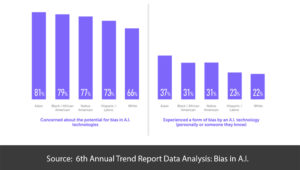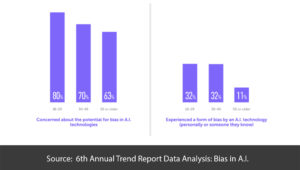Trend Report Deep Dive: A Look at The Bias In Artificial Intelligence
- Featured
- Trend Reports
The rapid development of Artificial Intelligence (A.I.) has opened a window in time to discuss, debate, and dream of the many ways this technology could impact all aspects of our life. Being on the precipice of an era where machines can emulate human intelligence is also cause for reflection on questions and issues around what it means to be human.
The 6th Annual Thinkwell Trend Report isn’t just about the future possibilities of A.I. technologies within location-based experiences, but also about the realities and challenges that face the people that use A.I. The survey and report were created during a challenging year which laid bare many of the ways in which different human identities can lead to vastly divergent lived experiences. We saw evidence of deep divisions and conflicts along racial, social, socio-economic and gendered lines in recurrent marches and protests, in disturbing revelations of harassment and assault, in the way a worldwide pandemic proved disproportionately deadly based on age, ethnicity, and socio-economic status, and the continuing and widening gap between different economic groups.
For these reasons we felt it was important that this Guest Experience Trend Report on Artificial Intelligence include questions within its survey of over 1,300 people that could evaluate the ways that race, gender, and age can influence one’s general attitude towards (and direct experiences with) emerging A.I. technologies. The results from this set of survey questions were then summarized in two Data Analysis articles accompanying the main trend report.
- Bias in A.I. – How have different people experienced bias in A.I. technologies, and how would they suggest addressing the issue?
- Generation Gaps – To what degree does age determine attitudes towards A.I. technologies?
Among some of the key findings of these reports:
- Racial identity of respondents contributed up to a 15% difference in reported first-hand experience of bias, as well as general concern about bias in A.I. technologies.
- Asians reported both the most concern and direct experience, while white respondents reported the least.
- Men and women exhibited similar levels of concern about Artificial Intelligence bias. Men were more positive about reporting personal examples of bias they experienced than women, who were more uncertain about their experiences of potential bias.
- Younger people were both more concerned about the challenges of A.I. (and supportive of regulating this technology), yet were also more optimistic about its future benefits than people from older generations.
The implications of this data should have a profound effect on the process of designing for social experiences that involves A.I. technology. For example, facial recognition technologies have been touted for their ability to provide more personalized, seamless, or interactive guest experiences, yet emerging evidence of their uneven performance across ranges of skin tone and race- or gender-linked facial characteristics may unfairly target or exclude certain guests. Additionally, the very presence of this technology may trigger or enhance existing concerns of guests. The data also suggests that younger audiences in particular may demand more transparency about how A.I. technologies are used as part of the guest experience.
Being anti-bias requires a proactive approach. We at Thinkwell believe that inclusive design must engage every member of the design and development team, and that the team must include people of diverse backgrounds, identities, and viewpoints at all levels of seniority within the company structure. To be proactive in this belief, Thinkwell has established its own Diversity & Inclusion Council. The Council is tasked with continuing to identify not just challenges, but possible solutions, and with the goal of continuing to empower diverse voices within our company and within our industry. A small but important aspect of that empowerment includes collecting the data necessary to better understand and work against racism, sexism, and ageism within the experience design industry, a task that the Trend Report helps to further illuminate.
Related Posts
Becoming Dementia Friendly
- Blog Posts
- Subject Matter Expert
In the world of museums and cultural spaces, conversations surrounding...
Repeatability: Once More, With Meaning
- Blog Posts
The question of what makes an experience “repeatable” offers a...

